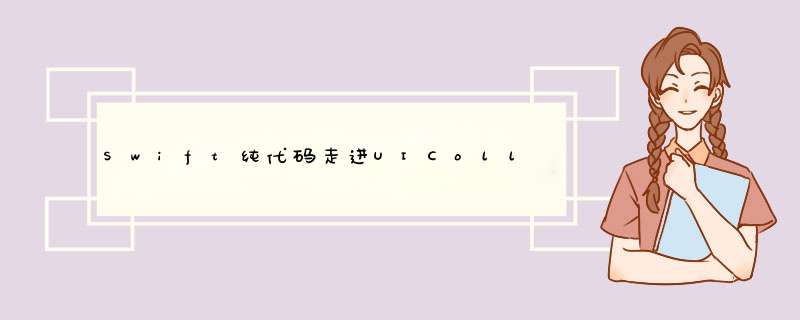
Swift对于一门新的iOS编程语言,他的崛起是必然的
我们这群老程序员们学习新的技能也是必然的
不接受新技能将被这大群体无情的淘汰
So 我欣然接受这门看似不成熟的语言
下面我们说说Swift中比较常见的控件UICollectionVIEw
首先我们设置一个全局的UICollectionVIEw和一个数据源
var colltionVIEw : UICollectionVIEw?
var dataArr = NSMutableArray()
然后设置UICollectionVIEw的3个代理
UICollectionVIEwDelegate,UICollectionVIEwDataSource,UICollectionVIEwDelegateFlowLayout
接下来我们要做的是overrIDe func vIEwDIDLoad()方法中初始化一些必要的对象
overrIDe func vIEwDIDLoad() { super.vIEwDIDLoad() var layout = UICollectionVIEwFlowLayout() colltionVIEw = UICollectionVIEw(frame: CGRectMake(0,0,wIDth,height),collectionVIEwLayout: layout) //注册一个cell colltionVIEw! .registerClass(Home_Cell.self,forCellWithReuseIDentifIEr:"cell") //注册一个headVIEw colltionVIEw! .registerClass(Home_headVIEw.self,forSupplementaryVIEwOfKind:UICollectionElementKindSectionheader,withReuseIDentifIEr: "headVIEw") colltionVIEw?.delegate = self; colltionVIEw?.dataSource = self; colltionVIEw?.backgroundcolor = UIcolor.whitecolor() //设置每一个cell的宽高 layout.itemSize = CGSizeMake((wIDth-30)/2,250) self.vIEw .addSubvIEw(colltionVIEw!) self .getData()} 然后我们实现UICollectionVIEw的代理方法
//返回多少个组func numberOfSectionsInCollectionVIEw(collectionVIEw: UICollectionVIEw) -> Int { return 1}//返回多少个cellfunc collectionVIEw(collectionVIEw: UICollectionVIEw,numberOfItemsInSection section: Int) -> Int { return dataArr.count}//返回自定义的cellfunc collectionVIEw(collectionVIEw: UICollectionVIEw,cellForItemAtIndexPath indexPath: NSIndexPath) -> UICollectionVIEwCell { let cell = collectionVIEw.dequeueReusableCellWithReuseIDentifIEr("cell",forIndexPath: indexPath) as! Home_Cell var model = GoodsModel() model = dataArr[indexPath.row] as! GoodsModel let url : NSURL = NSURL(string: model.image_url as String)! cell.imgVIEw!.hnk_setimageFromURL(url) cell.layer.borderWIDth = 0.3; cell.layer.bordercolor = UIcolor.lightGraycolor().CGcolor cell.TitleLabel!.text = model.short_name cell.priceLabel!.text = "¥"+model.p_price cell.readLabel!.text = "��"+model.like_count return cell}//返回headVIEw的宽高func collectionVIEw(collectionVIEw: UICollectionVIEw,layout collectionVIEwLayout: UICollectionVIEwLayout,referenceSizeforheaderInSection section: Int) -> CGSize{ return CGSize(wIDth: wIDth,height: height/1.6)}//返回自定义headVIEw或者FootVIEw,我这里以headvIEw为例func collectionVIEw(collectionVIEw: UICollectionVIEw,vIEwForSupplementaryElementOfKind kind: String,atIndexPath indexPath: NSIndexPath) -> UICollectionReusableVIEw{ var v = Home_headVIEw() if kind == UICollectionElementKindSectionheader{ v = colltionVIEw!.dequeueReusableSupplementaryVIEwOfKind(kind,withReuseIDentifIEr: "headVIEw",forIndexPath: indexPath) as! Home_headVIEw } return v}//返回cell 上下左右的间距func collectionVIEw(collectionVIEw: UICollectionVIEw,insetForSectionAtIndex section: Int) -> UIEdgeInsets{ return UIEdgeInsetsMake(5,10,5,10)}
然后我们来获取数据,这里的话我用的是Alamofire进行的网络请求,URL不方便透露
//获取数据func getData(){ Alamofire.request(.GET,GoodsUrl).responseJsON() { (req,_,JsON,_) -> VoID in if let j = JsON as? NSDictionary{ var data = j.valueForKey("data")as! NSArray for dict in data{ var model = GoodsModel() model.Analytical(dict as! NSDictionary) self.dataArr.addobject(model) } self.colltionVIEw!.reloadData() } }}
接下来让我们看下cell里面究竟写了些什么玩意
class Home_Cell: UICollectionVIEwCell { let wIDth = UIScreen.mainScreen().bounds.size.wIDth//获取屏幕宽 var imgVIEw : UIImageVIEw?//cell上的图片 var TitleLabel:UILabel?//cell上Title var priceLabel:UILabel?//cell上价格 var readLabel:UILabel?//cell上的阅读量overrIDe init(frame: CGRect) { super.init(frame: frame) //初始化各种控件 imgVIEw = UIImageVIEw(frame: CGRectMake(0,-10,(wIDth-30)/2,200)) self .addSubvIEw(imgVIEw!) TitleLabel = UILabel(frame: CGRectMake(5,CGRectGetMaxY(imgVIEw!.frame)-12,(wIDth-40)/2,50)) TitleLabel?.numberOflines = 0 TitleLabel?.Font = UIFont.boldSystemFontOfSize(14.0) TitleLabel?.textcolor = UIcolor.lightGraycolor() self .addSubvIEw(TitleLabel!) priceLabel = UILabel(frame: CGRectMake(5,CGRectGetMaxY(TitleLabel!.frame),(wIDth-40)/2/2,20)) priceLabel?.numberOflines = 0 priceLabel?.Font = UIFont.boldSystemFontOfSize(14.0) priceLabel?.textcolor = UIcolor.lightGraycolor() self .addSubvIEw(priceLabel!) readLabel = UILabel(frame: CGRectMake((wIDth-30)/2/2,20)) readLabel?.numberOflines = 0 readLabel?.textAlignment = NSTextAlignment.Right readLabel?.Font = UIFont.boldSystemFontOfSize(14.0) readLabel?.textcolor = UIcolor.lightGraycolor() self .addSubvIEw(readLabel!)}required init(coder aDecoder: NSCoder) { fatalError("init(coder:) has not been implemented")}} 是不是还觉得缺少点什么?没错,我们的headvIEw是不是还没整啊?
接下来呢,我们看下UICollectionVIEw的headvIEw该怎么设置
重点在这里!首先headvIEw要继承UICollectionReusableVIEw
然后我们这个.m文件里面并没有看到overrIDe func vIEwDIDLoad()这样的方法
那我们怎么办呢?
接下来就看我的了
我们点到我们继承的UICollectionReusableVIEw里面去看里面有些什么方法
功夫不负有心人,��终于找到了一个可以让我们用的方法
overrIDe func applyLayoutAttributes(layoutAttributes: UICollectionVIEwLayoutAttributes!){} 我们可以把要自定义的UI 请求数据什么的都放这方法里面
也就相当于我们VC里面的overrIDe func vIEwDIDLoad()这个方法
教程到结束
有任何问题可以留言,定期抽时间回复
版权归©Bison所有 任何转载请标明出处!
> 更多经验请点击
>最终效果图如下
以上是内存溢出为你收集整理的Swift纯代码走进UICollectionView全部内容,希望文章能够帮你解决Swift纯代码走进UICollectionView所遇到的程序开发问题。
如果觉得内存溢出网站内容还不错,欢迎将内存溢出网站推荐给程序员好友。
欢迎分享,转载请注明来源:内存溢出

 微信扫一扫
微信扫一扫
 支付宝扫一扫
支付宝扫一扫
评论列表(0条)